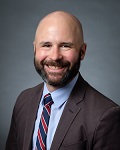2020
Richard Anderson

Position Description
The Humanities Action Lab (HAL) is a national center for testing and evaluating how to activate public humanities—especially participatory history, memory, and story-sharing—to address urgent social issues. HAL is a coalition of universities, issue organizations, and public spaces in over 20 cities, based at Rutgers University-Newark, that collaborate to produce community-curated national public humanities projects. HAL’s first project, States of Incarceration, is a traveling exhibit, web platform, and series of public dialogues on the past, present, and future of mass incarceration. Launched in 2016, it continues to welcome new local partners who both create their own local “chapter” and host the national exhibit, and is currently booked through the end of 2020, with more partners joining all the time. HAL’s newest project is Climates of Inequality: Stories of Environmental Justice, created by students and frontline communities in 21 different cities, telling histories of environmental justice and their legacies for climate change through an installation that includes VR and other media. Climates of Inequality is traveling to all the communities that created it, with new partners joining along the way. The Public Programming and Exhibitions Manager supports the local staging of both States of Incarceration and Climates of Inequality as they travel. This will afford opportunities for collaboration with all three institutions comprising HAL’s local teams: university, community organization(s), and exhibiting venue. In the months leading up to each showing, the Manager will work closely with local hosts to design public programs, build collaborations with local organizations, develop and execute a communications and press strategy, and plan for documentation and evaluation. Using HAL project funds, the Manager will travel to select host communities (approximately three per year) for three to four days to support and document the public programs and conduct visitor and participant evaluations. By traveling to program sites to represent the national collective and observe, document, and evaluate the local programs, the Manager will connect programs together into a shared national conversation.

